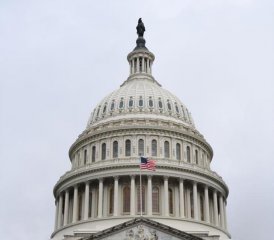
U.S. President Donald Trump said late Saturday that he would quickly withdraw the United States from the 24-year-old North American Free Trade Agreement (NAFTA), in an attempt to force Congress to approve a revised version of the pact.
"I will be formally terminating NAFTA shortly," Trump told reporters aboard Air Force One en route from the Group of Twenty (G20) summit in Argentina, according to a White House press release.
"Congress will have a choice of approving the USMCA, which is a phenomenal deal, much, much better than NAFTA," said Trump, who has repeatedly threatened to pull out of NAFTA entirely.
The U.S. president, along with Canadian and Mexican leaders, signed the new deal, the U.S.-Mexico-Canada Agreement (USMCA), on Friday after more than a year of intense negotiations.
Hailing the deal as "modern and balanced," the president said at the signing ceremony that it has been "well-reviewed" and he doesn't expect to have much problem in Congress.
The new deal has, however, generated a groundswell of opposition from lawmakers especially the Democrats, who will take control of the House in January, making a smooth passage unlikely.
"It's disappointing but not surprising" that the U.S. president would try to force Congress to reinstate the status quo of #NAFTA, instead of working constructively with Congress to improve his proposed agreement, Henry Connelly, a spokesman for House Democratic leader Nancy Pelosi, said on Twitter Sunday morning.
Pelosi, who is expected to take the role of House Speaker in January, has repeatedly expressed deep concerns over the deal's enforceability.
"We are waiting to see enforcement provisions relating to workers and the environment," Pelosi said Friday in a statement, describing the deal as a "work in progress." The USMCA requires at least 40 percent of car production to come from factories with an average wage of 16 U.S. dollars per hour.
"I think we should see if we can get it passed first," Republican Senator John Barrasso said on NBC News' Meet the Press Sunday. "I want to see how many Democratic votes come on board for this."
U.S. Congress can suggest small changes to be made to the legislation, and many lawmakers have been waiting for an economic impact study from the U.S. International Trade Commission before making their final decision. The commission has up to 105 days, or by mid-March to complete a report.
In a hearing held mid-November, John Bozzella, president of the Association of Global Automakers, said the new agreement could hurt the industry. The USMCA would raise the requirement for North American content in cars to a whopping 75 percent from 62.5 percent, among other things. Bozzella said automakers will need to invest in "elaborate processes" to ensure compliance with such rules, and suppliers will have to establish similar "costly processes."
Meanwhile, a number of lawmakers and business groups are trying to push for the removal of U.S. tariffs on steel and aluminum imports from Canada and Mexico, which have inflicted harm upon American manufacturers and consumers, raising costs for a wide array of industries.
"While there's a lot to like in this new agreement, I'm disappointed that the Section 232 tariffs on Canada and Mexico still remain in place," Republican Senator Rob Portman said in a statement on Friday.
Business Roundtable, an influential association of leading U.S. companies' executives, also called for a "prompt resolution" of the tariff issue between all three countries while reviewing the final text of the new trade agreement.





















Latest comments